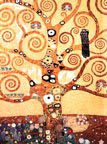
Here's another one for the Once Upon A Time Challenge. I'm not sure what category it falls into; maybe folklore? Urban mythology? Who knows; it's Neil Gaiman and it was terrific.
When Mr. Nancy dies, his son Fat Charlie is not sad. He is not angry. He is, as with all things concerning his father, embarrassed. Fat Charlie Nancy has a pretty simple relationship with his unusual father. In short, whatever Mr. Nancy does, Fat Charlie is embarrassed by it. End of story. So when Mr. Nancy dies, Charlie is ready to wash his hands of his whole embarrassing family.
Except.
When he goes to the funeral, he finds out from his little old lady neighbors that actually? He has a brother. Rather a flashy brother. Named Spider. Oh, and his father was a god. His father was Anansi the Spider, famous trickster. Specializing, apparently, in embarrassment.
Intrigued (and embarrassed), Fat Charlie asks his brother to visit him. And then all hell breaks loose. The world in which Fat Charlie desperately wishes to live ceases to be available to him, to be replaced by a world in which there are animal gods, and pesky brothers with god-like powers, and sassy policewomen who take an interest in him. Fascinating.
I have had this sitting on my shelf for a long time. I finished American Gods (in which Mr. Nancy is also a character) and just wasn't in the mood for what was described as "zany humor" or "scary and laugh-out-loud funny." I must be a god-awful curmudgeon because that just sounded totally not up my alley. So I waited.
And then I realized that since this dealt with folklore and gods and stuff, it probably fit into Once Upon A Time III, so I pulled it out. And guess what? I really enjoyed it. Yes, it was funny. And a little zany. But not too outrageous. It was smart and clever and insightful and a little bit scary, all the usual when you're reading a Gaiman book.
I especially liked Daisy, as no-nonsense as she turned out to be. I liked how everybody ended up where they were supposed to be. I felt kind of bad for Tiger. I thought Bird Woman was freaky. And I wished that Maeve hadn't died.
Mostly, it was just a really enjoyable read about family and misunderstandings, and finding your true whole self (even if you started out as only half a self). It's a good reminder that even when you feel as though parts of you are gone, lost forever -- you can grow back new parts. You can become whole again, like a starfish that loses a limb (or two).
I'm noticing another theme in my reading. Lately I've been readng books that focus on the telling of stories. Charles de Lint is full of storytelling characters. The Wood Wife was about telling stories in poetry and paintings. And all stories are Anansi's stories. Interesting. I've been feeling more and more like I'm living in a story, a grand adventure -- we don't know what's going to happen to the heroines next, but they are in the valley, going over big boulders and fighting floods and droughts -- but you know they've still got a ways to go because you're only halfway through the book. Maybe I'm being guided to read certain kinds of books. I like to think so.
Anyway, thanks, Neil. Another fantastic story. Um, you're really smart. And your books are terrific. Keep it up.








3 comments:
Thanks for stopping by my blog! I wanted to let you know that the unicorn does NOT die in the end of the book :)
Daisy was just terrific. I'm glad you enjoyed this so much! Storytelling is so often a big theme in his books. That's a significant part of the reason why I love him so much. And I haven't read much De Lint so far, but he seems to use that theme a lot too.
I really have to read this. James read it not long after it came out and loved it.
Post a Comment